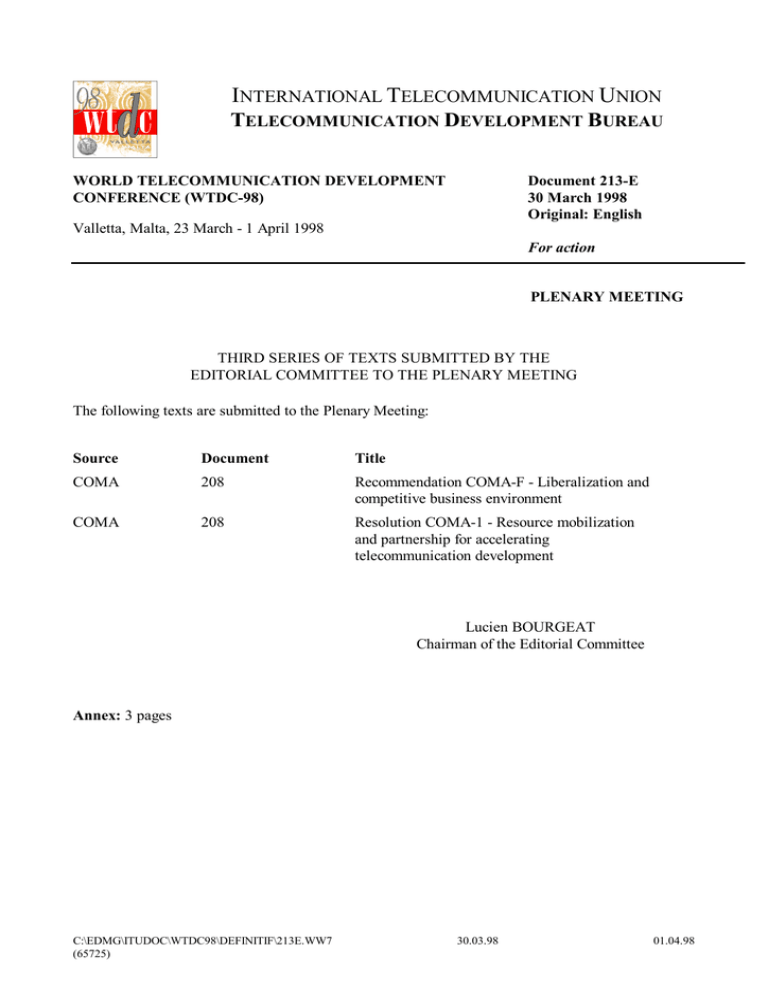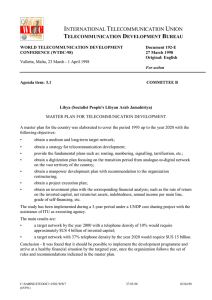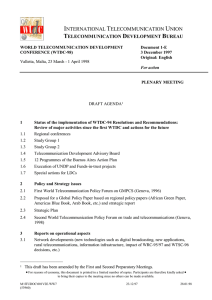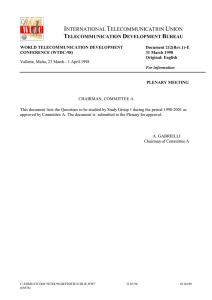I T U D
advertisement

I NTERNATIONAL TELECOMMUNICATION UNION TELECOMMUNICATION DEVELOPMENT BUREAU Document 213-E 30 March 1998 Original: English WORLD TELECOMMUNICATION DEVELOPMENT CONFERENCE (WTDC-98) Valletta, Malta, 23 March - 1 April 1998 For action PLENARY MEETING THIRD SERIES OF TEXTS SUBMITTED BY THE EDITORIAL COMMITTEE TO THE PLENARY MEETING The following texts are submitted to the Plenary Meeting: Source Document Title COMA 208 Recommendation COMA-F - Liberalization and competitive business environment COMA 208 Resolution COMA-1 - Resource mobilization and partnership for accelerating telecommunication development Lucien BOURGEAT Chairman of the Editorial Committee Annex: 3 pages C:\EDMG\ITUDOC\WTDC98\DEFINITIF\213E.WW7 (65725) 30.03.98 01.04.98 -2CMDT98/213-E RECOMMENDATION COMA-F LIBERALIZATION AND COMPETITIVE BUSINESS ENVIRONMENT The World Telecommunication Development Conference (Valletta, 1998), considering a) that the telecommunication sector is characterized by rapid globalization and marketoriented developments; b) that these developments have opened up the possibility of offering a wide range of services to customers for meeting their demands; c) that appropriate policies have to be developed for promoting reform with a view to enhancing market competition, facilitating network interconnection, technological development, network applications and cost reduction in the interest of the customers and the public, recognizing a) that many developing countries have not yet started preparing themselves for increased competition in the telecommunication environment; b) that several policy initiatives are needed to facilitate market competition; c) that the policy initiatives must lead to major participation of the private sector in the development of telecommunications, recommends 1 that appropriate actions should be identified and implemented for achieving market reform in a phased manner at national, intraregional and interregional levels; 2 that all countries should be urged to create and nurture a competitive business environment for promoting the growth and utilization of telecommunication facilities in their countries; 3 that frequent consultations should be encouraged among the various players involved at national, regional and global levels. C:\EDMG\ITUDOC\WTDC98\DEFINITIF\213E.WW7 (65725) 30.03.98 01.04.98 -3CMDT98/213-E RESOLUTION COMA-1 RESOURCE MOBILIZATION AND PARTNERSHIP FOR ACCELERATING TELECOMMUNICATION DEVELOPMENT The World Telecommunication Development Conference (Valletta, 1998), considering a) that the development of telecommunications in many developing countries suffers from a shortage of financial resources; b) that traditional methods of funding have not reduced the gap between developing and developed countries, recognizing a) that in some countries the telecommunication sector does not get due priority in budget allocation; b) that the telecommunication sector offers a high rate of return on investment and these returns are obtained more rapidly than in other sectors, yet financing from financial institutions in the telecommunication sector is relatively low; c) that practical and quick approaches are required for mobilizing funds for the telecommunication sector; d) that partnership should be mutually beneficial to narrow the gap, resolves 1 that investment be encouraged and innovative partnership schemes such as BOT, BTO, BLT, etc. and joint ventures should be explored for financing telecommunication development; 2 that administrations should continue to take the necessary steps for making the telecommunication sector more attractive for investment; 3 that there should be continued dialogue among telecommunication operators and funding agencies for preparing commercially attractive projects; 4 that efforts should be made to reduce delays in the funding and implementation of project cycles, C:\EDMG\ITUDOC\WTDC98\DEFINITIF\213E.WW7 (65725) 30.03.98 01.04.98 -4CMDT98/213-E invites ITU-D 1 to be the intermediary, facilitating development partnerships among all parties. ITU-D's involvement in specific projects amounts to a guarantee and ensures project continuity, which attracts investors; 2 to reflect the role of intermediary in its work, for example by: – encouraging regional telecommunication projects; – participating in the organization of training seminars; – signing agreements with other international organizations involved in development; 3 to promote transnational partnerships of knowledge-based enterprise incubators, in the telecommunication sector, involving developing countries; 4 to promote transnational partnerships of emerging companies, in the telecommunication sector, involving developing countries; 5 to promote education and training, in developing countries, over the complete industrial cycle, from the design of products and services to the establishment and operation of the corresponding companies; 6 to promote, in the developing countries, the conditions required for a successful knowledgebased enterprise incubator process; 7 to continue to assist developing countries to respond to global telecommunication restructuring, especially regarding financial issues. ____________ C:\EDMG\ITUDOC\WTDC98\DEFINITIF\213E.WW7 (65725) 30.03.98 01.04.98


